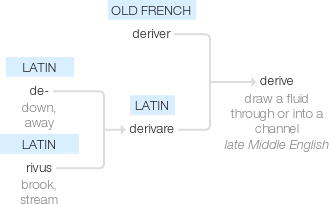Derive
late Middle English (in the sense ‘draw a fluid through or into a channel’): from Old French deriver or Latin derivare, from de- ‘down, away’ + rivus ‘brook, stream’.
wiktionary
From Middle English deriven, from Old French deriver, from Latin dērīvō(“to lead, turn, or draw off (a liquid), draw off, derive”), from dē(“away”) + rīvus(“a stream”); see rival.
etymonline
derive (v.)
late 14c., "descend from," from Old French deriver "to flow, pour out; derive, originate," from Latin derivare "to lead or draw off (a stream of water) from its source" (in Late Latin also "to derive"), from phrase de rivo (de "from" + rivus "stream," from PIE root *rei- "to run, flow").
From c. 1500 as "obtain by a process of reasoning." In reference to words, "arise by a process of word-formation," 1550s; meaning "trace or show derivation" is from c. 1600. General sense of "get, gain, obtain" (as from a source or origin) is from 1560s; that of "arise, spring" (from) a source or origin is from 1660s. Related: Derived; deriving.
